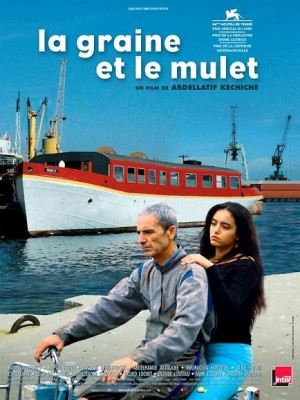| Reviews & Columns |
|
Reviews DVD TV on DVD Blu-ray 4K UHD International DVDs In Theaters Reviews by Studio Video Games Features Collector Series DVDs Easter Egg Database Interviews DVD Talk Radio Feature Articles Columns Anime Talk DVD Savant Horror DVDs The M.O.D. Squad Art House HD Talk Silent DVD
|
DVD Talk Forum |
|
|
| Resources |
|
DVD Price Search Customer Service #'s RCE Info Links |
|
Columns
|
|
|
Secret of the Grain - Criterion Collection, The
Criterion's Blu-ray edition makes a nice companion piece to another French title, similarly intimate, Olivier Assayas's Summer Hours (L'heure d'été, 2008), about a likewise strained but wealthy family coming to terms with their mother's death and the disposition of her valuable estate. As with that Blu-ray, Criterion does a fine job putting The Secret of the Grain into cultural context via numerous extra features. Filmed in high-definition video (on an HD Sony 900) the 1.85:1 transfer is problem-free.
The movie opens with an understated irony permeating its narrative. As patriarch Slimane Beiji is losing his shipyard job to corporate downsizing, his eldest son, irresponsible Majid (Sami Zitouni), operates a ferry tooling around the habor, inanely showcasing Sète's quaint shipyard and tuna boats for rich tourists. Though married to Russian immigrant Julia (Alice Houri) and the father of a toddler son, Majid sneaks away from the tour for a little afternoon delight with Mme. Dorner (Violaine de Carné), the Deputy Mayor's lusty wife.
The film is a bit like Kurosawa's Record of a Living Being (1955). Slimane is reticent much like Toshiro Mifune's 70-year-old patriarch in Kurosawa's film - women do most of the talking in this film - and likewise he straddles two dischordant families that he wearily attempts to provide for. Slimane is divorced from Souad (Bouraouïa Marzouk), the mother of his children, and for whom she regularly cooks extravagant Sunday meals of couscous with fresh mullet that Slimane provides. In a long, fascinating sequence depicting one of these meals, other family members are introduced, including shrewish cannery worker Karima (Farida Benkhetache), Slimane's bossy daughter, and Riadh (Mohamed Benabdeslem), the youngest son.
Slimane now lives at a nearby hotel-bar owned by his much younger (though still middle-aged) current lover, Latifa (Hatika Karaoui), the single mother of adult daughter Rym (Hafsia Herzi). They don't mind, but he feels like a kept man.
Facing an uncertain future, Slimane opts to use his severence pay to buy a delapidated boat that he plans to restore and turn into a dockside couscous restaurant, with his ex-wife cooking the same hearty meals she serves her family, his children working as waiters, cooks, and so forth. The devoted, determined Rym at his side (she does most of the negotiating), Slimane tries to get a bank loan but is refused for want of collateral, and the red tape in getting the proper licenses seems insurmountable. However, he comes up with an ingenious solution: a one-night-only soft opening, he invites city leaders and other VIPs, hoping that the food and atmosphere will speak for itself and secure the financial investment.
The film's many qualities aren't easily described, which may account for its variously inadequate English titles. The French title translates as "The Grain and the Mullet" but, fearing confusion, in Britain it was retitled Couscous. As film critic Wesley Morris wryly notes in his excellent booklet essay accompanying the disc, "The Secret of the Grain" inaptly suggests a documentary about harvesting wheat. As he put it, the film deserved "a title that puts you somewhere other than aisle seven at Trader Joe's."
More than anything else, the film impresses with its intimacy. Hand-held close-ups dominate, almost nose-to-nose with the film's characters. That, and the fine, naturalistic acting by imperceptively integrated professional and amateur actors, and perhaps at least partly improvised dialogue create the feeling of being seated alongside its characters. When the film audience first sees the family get together, the discussion among Slimane's adult children, most of whom have children of their own, quickly turns to the high cost of disposible diapers. Karima, who in an earlier scene mercilessly browbeats her two-year-old for resisting toilet-training, steers the obsessive and authentically true-to-life discussion. Later, at the dinner table, talk turns to the use (or not) of Arabic in the home, by the siblings and their children. As an American living in Japan with an extended Japanese family, I felt more than a little like the French husband of Lilia (Leila D'Issernio), Slimane's eldest (?) daughter.
Slimane's restaurant obviously is intended to provide his family with some kind of legacy, something to keep the family together and to atone for his great sin of leaving Souad for another woman. However, this only inflames tensions between Slimane's two factions. Rym does most of the leg work but gets no credit from the other family. The restaurant would benefit Slimane's children more than Rym and her mother, but except for Riadh they're generally self-involved, selfish and/or ambivilent to Slimane's plans. (Slimane's children constantly bitch and moan but aren't proactive; Rym and her mother are more practical and willing to do whatever it takes to get the job done, though the very end of the film demonstrates this too has drawbacks.)
The film climaxes with that opening night, an incredible 40-minute sequence that, because of the intimacy Kechiche establishes, becomes agonizingly suspenseful and grimly comical. Even before disaster strikes, the tension is palpable, and the realistic animosity among the various family members adds to the discomfort.
Also, the screenplay ever so slightly exposes an underlying theme of racial discord and the self-selling of cultural exoticism. The wealthy and white potential investors and government officials are subtly condescending to their Arab-immigrant neighbors yet also attracted to their perceived exoticness. (And in turn, this prompts them to conspire against the restaurant's success, even before Slimane's establishment opens to the general public, less their own rival businesses suffer.) Mme. Dorner, for instance, is clearly attracted to Majid as a kind of "forbidden fruit," and later impresses her friends with a few words of Arabic she obviously picked up from her secret lover. Rym's climactic belly dance in the film's justly celebrated last act indulges cultural expectations ("with a little sex," to quote Sullivan's Travels) while her selfless self-exploitation elicits a mixture of gratitude and resentment from Slimane's family.
The ensemble cast is superb because the acting is totally invisible; it's hard to believe we're looking at actors giving performances and unrelated to one another by blood or marriage. As Morris puts it, "We might as well be guests at their table."
Video & Audio
As The Secret of the Grain was filmed in high-definition, the transfer was done entirely electronically; film elements never entered the picture. According to Criterion's notes, it was "converted directly from the Digital Intermediate color space to SMPTE Rec. 709 24fps 1080p and approved by director Abdellatif Kechiche." The DTS-HD soundtrack, in French and Arabic with bits of Russian, was mastered at 24-bit from the original digital audio master files. The English subtitles are generally good and unobtrusive, but I'd prefer more thorough translations of the credits and text inserts (here including pages from Slimane's business proposal).
Extra Features
The supplements, while not entirely satisfying, are nonetheless plentiful and generally good. Included is a new video interview with the director, who's articulate but not particularly illuminating. More interesting is Sueur ("Sweat"), an extended re-edit of the belly dancing sequence featuring much unused footage, presented as if this part of the film were viewed entirely from the perspective of the restaurant's dining room, with no cutaways to other action.
Herzi, Marzouk, and the film's musicians are interviewed (and, in the latter case, also perform) in separate featurettes; Kechiche and Herzi are interviewed on 20 heures, a French news program and a trailer is included.
Parting Thoughts
A deeply humanist work with more than a dozen engrossing characters, The Secret of the Grain is an outstanding film and a DVD Talk Collector Series title.
Stuart Galbraith IV's latest audio commentary, for AnimEigo's Musashi Miyamoto DVD boxed set, is on sale now.
|
| Popular Reviews |
| Sponsored Links |
|
|
| Sponsored Links |
|
|
| Release List | Reviews | Shop | Newsletter | Forum | DVD Giveaways | Blu-Ray | Advertise |
|
Copyright 2024 DVDTalk.com All Rights Reserved. Legal Info, Privacy Policy, Terms of Use,
Manage Preferences,
Your Privacy Choices | |||||||













